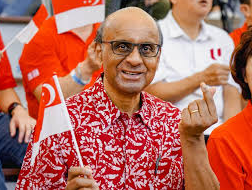The new framework ensures international appointments align with national interests while safeguarding official duties.
SINGAPORE: Parliament has passed a constitutional amendment enabling the President and government ministers to hold roles in foreign and international organizations in their private capacities, provided these align with Singapore’s national interests.
The Constitution of the Republic of Singapore (Amendment No. 3) Bill was approved on Nov 22, with 75 Members of Parliament (MPs) from the ruling People’s Action Party (PAP) voting in favor. Eight opposition lawmakers from the Workers’ Party (WP) and Progress Singapore Party (PSP) opposed the motion.
This amendment outlines a “principled framework” for international appointments, said Deputy Prime Minister Lawrence Wong. It seeks to balance leveraging the expertise of Singapore’s leaders to advance the country’s global standing while preserving their dignity and responsibilities.
Framework Highlights
The President can accept international roles based on three conditions:
The appointment must not breach constitutional rules prohibiting commercial activities.
The Cabinet must advise that the role serves the national interest.
The President must concur with the Cabinet’s advice.
Similarly, ministers require the Prime Minister’s approval to accept international appointments. They remain accountable to Cabinet instructions to ensure their roles do not conflict with their official duties.
Deputy Prime Minister Wong clarified that remuneration for such roles must be declined or donated to charity. Travel expenses for related appointments would be funded by the government, akin to official trips.
Why the Amendment Matters
Singaporean leaders have often been tapped for roles in prestigious global organizations. President Tharman Shanmugaratnam currently holds positions with the World Economic Forum and the UN Human Development Report advisory board, among others. The amendment formalizes such engagements, ensuring they align with national priorities.
“These roles allow Singapore to remain connected to global conversations and influence critical international decisions,” said Mr. Wong.
Parliamentary Debate
Opposition MPs raised concerns about potential conflicts with official responsibilities. WP’s Gerald Giam questioned whether such roles might distract from domestic duties, noting the President’s substantial annual salary and operational budget.
Others, including PAP MPs Denise Phua and Yip Hon Weng, sought clarity on how appointments would be vetted and whether public funds would be appropriately utilized.
Mr. Wong emphasized that international roles must demonstrate clear benefits for Singapore, such as shaping global agendas or fostering strategic ties. “The President’s participation in these organizations must advance national interests, not personal ones,” he asserted.
Implications for Singapore’s Global Standing
The government believes these international roles enhance Singapore’s influence and reputation on the world stage. Opportunities to serve in respected global institutions are rare and should be seized, said Mr. Wong.
“This amendment ensures our leaders can contribute meaningfully to international initiatives while upholding the nation’s interests and integrity,” he added.
With the new framework, Singapore reinforces its commitment to active participation in global governance while maintaining robust safeguards for its leadership.








